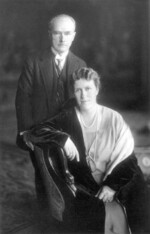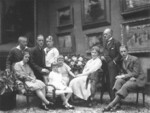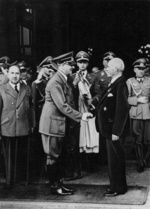Gustav Krupp
| Surname | Krupp |
| Given Name | Gustav |
| Born | 7 Aug 1870 |
| Died | 16 Jan 1950 |
| Country | Germany |
| Category | Commerce-Industry |
| Gender | Male |
Contributor: C. Peter Chen
ww2dbaseGustav von Bohlen und Halbach was the descendant of two prominent German-American families. His father, born a commoner, was made a noble by the Grand Duke of Baden when his family emigrated back to Germany. At the age of eighteen, he volunteered for the 2nd Baden Dragoons, then proceeded to study law at Lausanne, Strasbourg, and Heidelberg. With a law degree, he became a diplomat like his father; in the role, he served in Washington, Peking, and the Vatican. Despite his experience abroad, he showed no signs of enlightenment. His personal philosophy prevented it. To him, to broaden one's horizon was a sign of independence, which bordered on being disloyal to Berlin; Baron Tilo von Wilmowsky later said that he "had a very definite way of subordinating himself to the authority of the state". To him, loyalty was his most treasured characteristic.
ww2dbaseIn Oct 1906, Krupp was arranged by Kaiser Wilhelm to marry Bertha Krupp, the heir of the industrial conglomerate. Kaiser also made him Gustav Krupp von Bohlen und Halbach in order to legitimize his takeover of the company; eldest male heirs of all future generations were also bestowed this honor.
ww2dbaseKrupp was a stoic man, perhaps due to his diplomat training, never showing much emotion. Even the announcement of the birth of his son sounded like a business deal. "I feel compelled to inform the board personally and in my wife's name at this earliest possible moment of the birth to us of a healthy son", he reported to his colleagues at Friedrich Krupp AG. But what really set him apart from others was his prompt habits. For example, overnight guests at his residence were informed that breakfast was to be served promptly at 0715; if they arrived at 0716, the door was shut and they were denied the meal. To be fair, he treated himself to the same rigorous schedule as well. When dining alone, he gave himself exactly 15 minutes to eat. When he left his house, his carriage driver knew that the moment Krupp stepped into the carriage the wheels needed to be turning.
ww2dbaseBy World War I, Friedrich Krupp AG's status as Germany's armorer could not be doubted. The 94-ton howitzer "Big Bertha" became the company's signature contribution to the German war effort, although of course the company's contribution to the war went way beyond the handful of big guns. When the tide of the war turned against Germany, Krupp refused to acknowledge the possibility of losing the war. According to his own calculations, as he told his colleagues, Germany was about to turn back the tide at any time. The Kanonenkönig ("Cannon King") was convinced that the shelling of Paris by Krupp-made 200- to 230-pound shells from Krupp-made 21-centimeter howitzers located 31 miles outside the French capital was a sign of the eventual victory. He was wrong, and he was devastated.
ww2dbaseAs Germany suffered under the Versailles Treaty, Friedrich Krupp AG maintained its profitability by a combination of agricultural equipment and consumer goods, though that was only what the company wanted the world to see. Through subsidiaries outside of Germany such as Blessing and Company at the Hague, Krupp kept his company knee-deep in weapons research. Foreign subsidiaries also played a part in hiding Krupp assets of all kinds at a time when France was eager to take possession of anything German that could be used to rebuild the war-torn country. Tanks researched under the false pretense of an agricultural tractor were one of the many weapons that the company secretly developed. Sometimes the secrets leaked out, for example a sketch for a heavy tractor included a 7.5-centimeter cannon. In another instance a heavy tractor's specifications included the need to easily use the railroad systems of Belgium and France. A company memorandum found years later noted that of all weapons used in 1939-1941, "the most important were already fully developed in 1933." As Adolf Hitler's Nazi Party rose to power in the 1930s, the production of weapons expanded. Of the wide range of weapons developed at this time, perhaps the most important historically was the 88mm gun, which Allied airmen would come to fear and respect a handful of years down the road.
ww2dbaseKrupp was not always a Nazi, however. His support for Hitler was one which resulted from convenience. Although Friedrich Krupp AG was known for offering unbelievably generous compensation packages for its works and social programs in its company towns, Krupp distrusted liberals and eyed unions with suspicion (in fact, he banned unions from his factories). His support for the Nazi Party only materialized out of the promised, and delivered, anti-union laws. That initial support triggered off the fiercely loyal Krupp that had not really been seen since WW1. On 4 May 1933, Krupp became the chairman of the Association of German Industrialists and unwittingly a loyal Nazi; he thought he was only being a loyal German. His first act was to expel all Jews from the top ranks of the industrial world, then on 22 May, he consolidated the powers of the heads of German industries, making the executives dictators in their own companies. "In underwriting an end to political elections, ... they had unwittingly liquidated their own independence." Behind his back, liberal-leaning industrialists called him a "Obernazi"; it was not without reason. By spring of 1934, the Nazi Party named him leader of the German economy. Krupp returned the favor by remaining quiet. After the bloody purge of 30 Jun 1934 that came to be known as the Night of the Long Knives, with full knowledge of what had happened, he kept his mouth shut.
ww2dbaseIn 1937, Krupp was sick of the politics and gave up the titles the Nazi Party had given him. He knew that his title as the head of Friedrich Krupp AG far outweighed any title Berlin could ever bestow upon him. He could be a loyal German without favors from Berlin. Had it been any other man, Berlin would have responded, but a man of Krupp's stature had the rare power of choice under Nazi Germany. Although his patriotism could not be doubted, he also ran his company with its private interests first. For example, despite Berlin's protest, Friedrich Krupp AG never became solely a weapons manufacturer. The company refused to convert their nonmilitary production of agriculture products, locomotives, and dredging equipment. Krupp even kept a Jew, an electrical engineer, on the payroll as a sign of defiance to the Nazi politicians in Berlin. None of these rebellious acts hurt Friedrich Krupp AG's importance to Berlin. In fact, the state continued to help Friedrich Krupp AG expand its operations in the territories it had acquired. At the eve of the invasion on Poland, Krupp's empire was consisted of 81 factories, many wholly owned subsidiaries, and controlling interest in 110 firms; the empire was described as a giant octopus, with the length of the body forming a vertical monopoly in the heavy industries landscape and the tentacles reaching every corner of the Reich.
ww2dbaseAs the European War began, although Krupp was still nominally the head of Friedrich Krupp AG, his mind was already failing him. In 1941, he suffered a crippling stroke, but only his family and his physician Dr. Gerhardt Wiele knew; to everyone outside the circle, nothing had happened. Krupp continued to put on a show, even keeping his horseback riding habit daily with the help of two servants. Though his brother-in-law Wilmowsky had no doubt in his mind that Krupp's health was rapidly deteriorating, it was not for a long time before Krupp admitted it to him when he noted "[p]lease give me a word when you notice I can't find it", suggesting that his mind was not nearly as sharp as it had been years past. In the personal diaries of Joseph Goebbels, the entry on 10 Apr 1943 noted that "Old man Bohlen, now seventy-two and a half years old, is already somewhat crazy."
ww2dbaseIt was around this time when his son Alfried von Bohlen und Halbach and the other executives took over the company's entire operations. His son was officially given the name Krupp and became the head of the company in Nov 1943, and the elder Krupp, who now had relinquished the Krupp name, retired to Blühnbach, Austria. At the time of his retirement, the Krupp enterprise was worth 237,316,093 marks, more than three times the company's worth in 1933, and that number did not even include all the companies Friedrich Krupp AG had absorbed through Germany's conquests.
ww2dbaseOn 25 Nov 1944, while walking alone in Blühnbach's garden, Gustav von Bohlen und Halbach suddenly began running toward the castle for no apparent reason. He tripped before his wife and the servants could stop him. While on the way to the hospital, his car swerved to avoid an accident, and he further injured himself after putting his head against a metal bar behind his driver. For the next eight weeks, he remained in the hospital, where he suffered his second stroke. He was to be attended to around the clock for the remainder of his life.
ww2dbaseAfter the war had ended, Gustav von Bohlen und Halbach was charged with war crimes, particularly the use of slave labor, including prisoners of concentration camps. The charges were eventually dropped due to his failing health and senility, and many argued that his son Alfried Krupp was tried and found guilty in his stead. He passed away in Austria in 1950. He was cremated in Salzburg and the ashes were buried at Obergrombach, Baden, Germany.
ww2dbaseSource: the Arms of Krupp.
Last Major Revision: Dec 2006
Gustav Krupp Interactive Map
Photographs
 |  |  |
Gustav Krupp Timeline
| 7 Aug 1870 | Gustav Krupp was born. |
| 16 Jan 1950 | Gustav Krupp von Bohlen und Halbach passed away at the Blühnbach Castle in Werfen, Salzburg, Austria. |
Please consider supporting us on Patreon. Even $1 per month will go a long way! Thank you. Please help us spread the word: Stay updated with WW2DB: |
Visitor Submitted Comments
All visitor submitted comments are opinions of those making the submissions and do not reflect views of WW2DB.

» The Arms of Krupp
- » 1,181 biographies
- » 337 events
- » 45,132 timeline entries
- » 1,249 ships
- » 350 aircraft models
- » 207 vehicle models
- » 376 weapon models
- » 123 historical documents
- » 261 facilities
- » 470 book reviews
- » 28,427 photos
- » 365 maps
Thomas Dodd, late 1945
Please consider supporting us on Patreon. Even $1 a month will go a long way. Thank you!
Or, please support us by purchasing some WW2DB merchandise at TeeSpring, Thank you!
1 Dec 2017 11:32:55 AM
my class is working on the holocaust more info plz